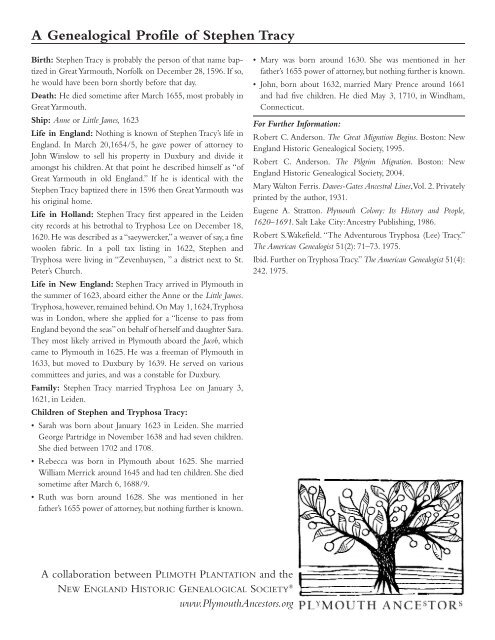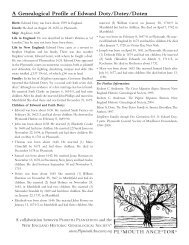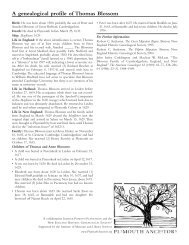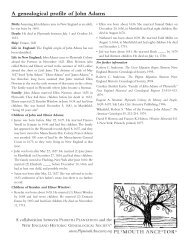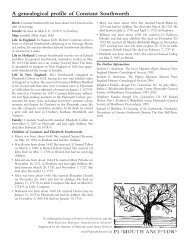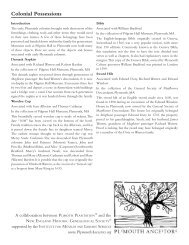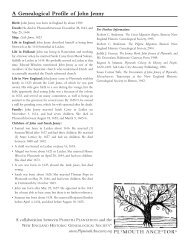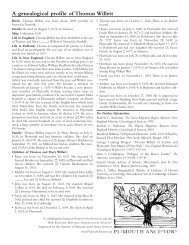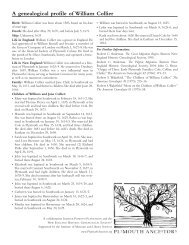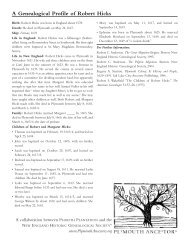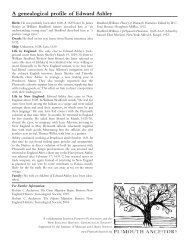A Genealogical Profile of Stephen Tracy - Plimoth Plantation
A Genealogical Profile of Stephen Tracy - Plimoth Plantation
A Genealogical Profile of Stephen Tracy - Plimoth Plantation
You also want an ePaper? Increase the reach of your titles
YUMPU automatically turns print PDFs into web optimized ePapers that Google loves.
A <strong>Genealogical</strong> <strong>Pr<strong>of</strong>ile</strong> <strong>of</strong> <strong>Stephen</strong> <strong>Tracy</strong><br />
Birth: <strong>Stephen</strong> <strong>Tracy</strong> is probably the person <strong>of</strong> that name baptized<br />
in Great Yarmouth, Norfolk on December 28, 1596. If so,<br />
he would have been born shortly before that day.<br />
Death: He died sometime after March 1655, most probably in<br />
Great Yarmouth.<br />
Ship: Anne or Little James, 1623<br />
Life in England: Nothing is known <strong>of</strong> <strong>Stephen</strong> <strong>Tracy</strong>’s life in<br />
England. In March 20,1654/5, he gave power <strong>of</strong> attorney to<br />
John Winslow to sell his property in Duxbury and divide it<br />
amongst his children. At that point he described himself as “<strong>of</strong><br />
Great Yarmouth in old England.” If he is identical with the<br />
<strong>Stephen</strong> <strong>Tracy</strong> baptized there in 1596 then Great Yarmouth was<br />
his original home.<br />
Life in Holland: <strong>Stephen</strong> <strong>Tracy</strong> first appeared in the Leiden<br />
city records at his betrothal to Tryphosa Lee on December 18,<br />
1620. He was described as a “saeywercker,” a weaver <strong>of</strong> say, a fine<br />
woolen fabric. In a poll tax listing in 1622, <strong>Stephen</strong> and<br />
Tryphosa were living in “Zevenhuysen, ” a district next to St.<br />
Peter’s Church.<br />
Life in New England: <strong>Stephen</strong> <strong>Tracy</strong> arrived in Plymouth in<br />
the summer <strong>of</strong> 1623, aboard either the Anne or the Little James.<br />
Tryphosa, however, remained behind. On May 1, 1624,Tryphosa<br />
was in London, where she applied for a “license to pass from<br />
England beyond the seas” on behalf <strong>of</strong> herself and daughter Sara.<br />
They most likely arrived in Plymouth aboard the Jacob, which<br />
came to Plymouth in 1625. He was a freeman <strong>of</strong> Plymouth in<br />
1633, but moved to Duxbury by 1639. He served on various<br />
committees and juries, and was a constable for Duxbury.<br />
Family: <strong>Stephen</strong> <strong>Tracy</strong> married Tryphosa Lee on January 3,<br />
1621, in Leiden.<br />
Children <strong>of</strong> <strong>Stephen</strong> and Tryphosa <strong>Tracy</strong>:<br />
Sarah was born about January 1623 in Leiden. She married<br />
George Partridge in November 1638 and had seven children.<br />
She died between 1702 and 1708.<br />
Rebecca was born in Plymouth about 1625. She married<br />
William Merrick around 1645 and had ten children. She died<br />
sometime after March 6, 1688/9.<br />
Ruth was born around 1628. She was mentioned in her<br />
father’s 1655 power <strong>of</strong> attorney, but nothing further is known.<br />
A collaboration between PLIMOTH PLANTATION and the<br />
NEW ENGLAND HISTORIC GENEALOGICAL SOCIETY ®<br />
www.PlymouthAncestors.org<br />
Mary was born around 1630. She was mentioned in her<br />
father’s 1655 power <strong>of</strong> attorney, but nothing further is known.<br />
John, born about 1632, married Mary Prence around 1661<br />
and had five children. He died May 3, 1710, in Windham,<br />
Connecticut.<br />
For Further Information:<br />
Robert C. Anderson. The Great Migration Begins. Boston: New<br />
England Historic <strong>Genealogical</strong> Society, 1995.<br />
Robert C. Anderson. The Pilgrim Migration. Boston: New<br />
England Historic <strong>Genealogical</strong> Society, 2004.<br />
Mary Walton Ferris. Dawes-Gates Ancestral Lines,Vol. 2. Privately<br />
printed by the author, 1931.<br />
Eugene A. Stratton. Plymouth Colony: Its History and People,<br />
1620–1691. Salt Lake City:Ancestry Publishing, 1986.<br />
Robert S.Wakefield. “The Adventurous Tryphosa (Lee) <strong>Tracy</strong>.”<br />
The American Genealogist 51(2): 71–73. 1975.<br />
Ibid. Further on Tryphosa <strong>Tracy</strong>.” The American Genealogist 51(4):<br />
242. 1975.
Researching your family’s history can be a fun, rewarding, and occasionally<br />
frustrating project. Start with what you know by collecting information<br />
on your immediate family. Then, trace back through parents,<br />
grandparents, and beyond.This is a great opportunity to speak to relatives,<br />
gather family stories, arrange and identify old family photographs, and<br />
document family possessions that have been passed down from earlier<br />
generations.<br />
Once you have learned all you can from family members, you will<br />
begin to discover other sources. A wide variety <strong>of</strong> records can help you learn more about the lives <strong>of</strong> your ancestors.These<br />
include birth, marriage, and death records; immigration and naturalization records; land records; census records; probate records<br />
and wills; church and cemetery records; newspapers; passenger lists; military records; and much more.<br />
When you use information from any source — an original record, a printed book, or a website — always be careful to document<br />
it. If you use a book, you should cite the author or compiler, the full title, publication information and pages used.Also<br />
be sure to record the author’s sources for the information. If the author’s sources aren’t provided, you will have to try to find<br />
the original source. Many genealogical works contain faulty information, and the Internet also contains many inaccuracies. In<br />
order for your work to be accepted — by lineage societies and other genealogists — it must be properly documented.<br />
IMPORTANT GENEALOGICAL RESOURCES<br />
New England Historic <strong>Genealogical</strong> Society<br />
Founded in 1845, NEHGS is the country’s oldest and largest<br />
genealogical society.The library contains over 200,000 books,<br />
plus significant manuscript and micr<strong>of</strong>ilm collections, and a circulating<br />
library by mail. NEHGS members receive two periodicals,<br />
the Register and New England Ancestors, and can access<br />
valuable genealogical data online.<br />
NEHGS, 101 Newbury St., Boston, MA 02116;<br />
888-296-3447; www.NewEnglandAncestors.org.<br />
<strong>Plimoth</strong> <strong>Plantation</strong>: Bringing Your History To Life<br />
As a non-pr<strong>of</strong>it, educational organization our mission is: to <strong>of</strong>fer<br />
the public powerful experiences <strong>of</strong> history, built upon thorough<br />
research <strong>of</strong> the Wampanoag and Pilgrim communities.We <strong>of</strong>fer<br />
multiple learning opportunities to provide a deeper understanding<br />
<strong>of</strong> the relationship <strong>of</strong> historical events to modern America.<br />
Members have access to our Research Library.<br />
<strong>Plimoth</strong> <strong>Plantation</strong>, 137 Warren Avenue, Plymouth, MA 02632;<br />
508-746-1622; www.plimoth.org<br />
RECOMMENDED WEBSITES<br />
www.PlymouthAncestors.org<br />
www.CyndisList.com<br />
www.FamilySearch.org<br />
www.USGenWeb.org<br />
GENEALOGICAL LIBRARIES IN PLYMOUTH<br />
General Society <strong>of</strong> Mayflower Descendants Library<br />
A collection focused principally on the genealogies <strong>of</strong> the<br />
descendants <strong>of</strong> the Mayflower passengers.<br />
4 Winslow St., Plymouth; 508-746-3188; www.mayflower.org<br />
Plymouth Collection, Plymouth Public Library<br />
Over 1200 items relating to the descendants <strong>of</strong> the Pilgrims, as<br />
well as the many other immigrants who settled in the area.<br />
132 South St., Plymouth; 508-830-4250;<br />
www.plymouthpubliclibrary.org<br />
RECOMMENDED BOOKS<br />
The Complete Idiot’s Guide to Genealogy by Christine Rose and<br />
Kay Germain Ingalls,Alpha Books, 1997.<br />
Genealogist’s Handbook for New England Research by Marcia<br />
Melnyk, NEHGS, 1999.<br />
Shaking Your Family Tree:A Basic Guide to Tracing Your Family<br />
History by Ralph J. Crandall, NEHGS, 2001.<br />
Unpuzzling Your Past by Emily Croom, Betterway Books, 2003.<br />
A collaboration between PLIMOTH PLANTATION and the<br />
NEW ENGLAND HISTORIC GENEALOGICAL SOCIETY ®<br />
www.PlymouthAncestors.org


